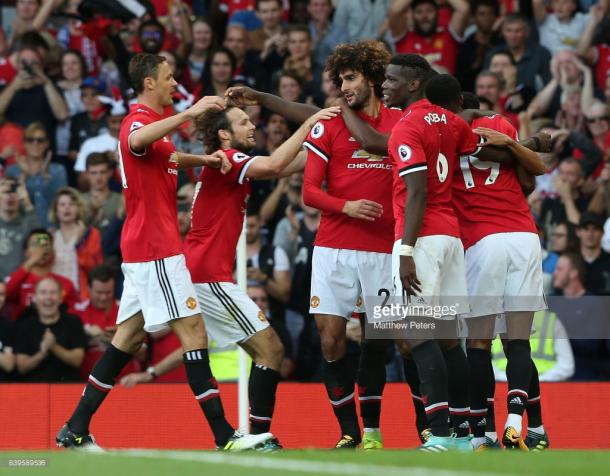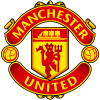As morning dawned, so too did one of the craziest days of the year: transfer deadline day, with its bluster and innuendo, its excess and flights of fancy. The rumours came thick and fast. Kylian Mbappé was heading for Paris on a loan-to buy arrangement between Paris Saint-Germain and Monaco that might just allow the Parisians to circumvent UEFA’s Financial Fair Play Regulations. Ross Barkley was moving to Chelsea until he decided after his medical he wanted to stay in Merseyside. Riyad Mahrez was released from Algeria training to fly to Barcelona – no, he was going to London, or, Leicester. Arsenal might sanction Alexis Sánchez’s sale – while on international duty on another continent – if they were able to seal the signing of Monaco’s Thomas Lemar for a figure that would have broken the world record had the deal been done back in May.
United stick with what they have
Through all the ludicrous stories of the last several days, there has been one club notably absent from the back pages: Manchester United. Besides signing Zlatan Ibrahimovic to a new contract after releasing him at the end of last season – a move that was somewhat expected, and did not even feel like a new signing – the Reds have been quiet in the transfer market since sealing Nemanja Matić’s deal from Chelsea.
To some extent, this was a surprise. Manager José Mourinho had earlier indicated his desire to bring in four new players over the summer, and in Matic, Romelu Lukaku, and Victor Lindelöf he had only three. Not only that, but the Portuguese was still without the winger that he so coveted for large portions of the summer, and a hole remains in the squad at left back.

Young players deserve first choice chance
Despite that, United made the right decision to spend no more money this summer. Had they been successful in luring Ivan Perišić from Inter Milan, it would have cut into the playing time of Marcus Rashford and Anthony Martial, who have been incredibly impressive in the first few weeks of the season. They have the ability and speed of thought to create and score the kind of chances that turn draws into wins, but require regular game action to continue improving.
Martial looks more confident than at any point since before Euro 2016, and he has been clinical in front of goal. Since his struggles on and off the field with both the French national team and in his personal life, Martial has not looked the player he was his first year in Manchester. This season, he seems different. He has been sharper with the ball at his feet, creating for himself and his teammates and finishing clinically.
While Rashford must improve his finishing, few players are able to turn a game on its head the way he is, and whether playing out wide or up front, he normally looks the most dangerous player on the pitch. Because they have been playing first team football for the last couple of years, it is easy to forget how young both are. They could still be at university. There are parts of the world where Martial would just be old to enough to drink legally and no shortage of places where Rashford is still too young to do so. These players are still developing and should be given every opportunity to do so.
At the other end of the pitch, Luke Shaw is still growing as a player. Injuries and loss of form have curtailed the development of a player who was talented enough to start a match at the World Cup while just 18. When he signed with the Reds, he was trumpeted as the left-back of the future for United and England. The uncertainty of the last few years have seen that prediction in doubt and his manager has not been shy about criticising him. Yet, Mourinho seems set to give him a chance at earning a first choice role, even though Shaw missed the majority of the pre-season with another injury. Particularly in a summer where the best left-backs in the world were either not for sale or had already been signed by Manchester City, standing firm and giving Shaw a chance to make the job his own was the right decision. He still has the ability to be United and England’s left-back of choice for the next decade.
Brexit has changed the transfer market
The sums involved not only in the market all summer long but particularly on deadline day – Arsenal reportedly bid £92million for Thomas Lemar – cannot continue in the same vein. It is true that football clubs are richer than ever before. However, just as there are divides between rich and poor clubs within leagues, the dichotomy between rich leagues and poor leagues is starker than it has been. And, as with the ongoing negotiations between the United Kingdom and the European Union over Brexit, other European leagues are standing together, and are charging Premier League clubs higher premiums than domestic challengers because they know the Premier League can pay it.
The Brexit impact does not end there. While Premier League clubs have more money than ever before to spend within England, Brexit has reduced their spending power in mainland Europe. Since the referendum, the pound has fallen 17% against the Euro. £1 was worth €1.31 15 months ago; today it is worth €1.09. Combined with the resolve of French, Italian, German, Spanish, and Portuguese clubs, the respective spending powers of United, Arsenal, Liverpool, and Chelsea, just to name a few, have fallen.
On top of that, no one is sure what the next sequence of television rights deals for the Premier League will look like. Sky and BT are less successful selling bundled packages to consumers the way they once did; Sky’s creation of a new Premier League only channel is an effort to arrest declining subscriptions. The long-term implications of consumers’ desire to watch things online will not be revealed for a while, as will their desire to pick and choose what they want rather than buy a base TV subscription. However, those choices will affect how much money the Premier League gets when the rights are next up for negotiation. The bubble will not keep expanding at this rate.
Chances are, there will still be a modest increased in the rights deal, but nothing like the last time around. It should be enough to remind teams this bubble will pop at some point. Teams that are flush with cash are better off not spending it in a climate where Gylfi Sigurdsson is sold for £45 million, which is £5 million more than Luis Suarez’s release clause at Liverpool was just three years ago. Sigurdsson is a phenomenal player, but Suarez is worth two to three times as much money.
At this moment in time, it is simply impossible to get value for players in the transfer market, as either a buyer or seller. Between the TV money in the Premier League, the pound's decreased power, and the shock to the football world over Neymar's transfer to PSG, no two fans let alone two clubs can agree how much players are worth at the moment.
With this unique confluence of factors, United made the right decision not to spend an obscene amount of money on a mediocre player, even if Mourinho has to settle for one less signing than he would have liked. Deadline day deals rarely work out how people hope they will. With this squad, Mourinho’s men are in a better position for a title run than at any point since 2012/13. The defence looks stout. Their spine is strong. Their horses are running. It will not be easy for anywhere to stop them anytime soon.










































